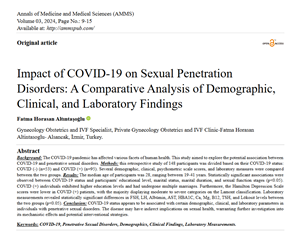Impact of COVID-19 on Sexual Penetration Disorders: A Comparative Analysis of Demographic, Clinical, and Laboratory Findings
Authors
##plugins.themes.bootstrap3.article.main##
Abstract
Background: The COVID-19 pandemic has affected various facets of human health. This study aimed to explore the potential association between COVID-19 and penetrative sexual disorders. Methods: this retrospective study of 148 participants was divided based on their COVID-19 status: COVID (-) (n=53) and COVID (+) (n=95). Several demographic, clinical, psychometric scale scores, and laboratory measures were compared between the two groups. Results: The median age of participants was 28, ranging between 19-41 years. Statistically significant associations were observed between COVID-19 status and participants' educational level, marital status, marital duration, and sexual function stages (p<0.05). COVID (+) individuals exhibited higher education levels and had undergone multiple marriages. Furthermore, the Hamilton Depression Scale scores were lower in COVID (+) patients, with the majority displaying moderate to severe categories on the Lamont classification. Laboratory measurements revealed statistically significant differences in FSH, LH, Albümin, AST, HBA1C, Ca, Mg, B12, TSH, and Lökosit levels between the two groups (p<0.05). Conclusion: COVID-19 status appears to be associated with certain demographic, clinical, and laboratory parameters in individuals with penetrative sexual disorders. The disease may have indirect implications on sexual health, warranting further investigation into its mechanistic effects and potential interventional strategies.
##plugins.themes.bootstrap3.article.details##
Copyright (c) 2024 Fatma Horasan Altıntaşoğlu

This work is licensed under a Creative Commons Attribution 4.0 International License.
Creative Commons License All articles published in Annals of Medicine and Medical Sciences are licensed under a Creative Commons Attribution 4.0 International License.
Kandi, Venkataramana, et al. “Mortality Rates of Coronavirus Disease 2019 (COVID-19) Caused by the Novel Severe Acute Respiratory Syndrome Coronavirus-2 (SARS-CoV-2).” Cureus, Mar. 2021. Crossref, https://doi.org/10.7759/cureus.14081.
A, Obioma. “Potential Impact of COVID-19 Pandemic on the Socio-Economic Situations in Nigeria: A Huge Public Health Risk of Unprecedented Concern.” Journal of Quality in Health Care & Economics, vol. 3, no. 4, 2020. Crossref, https://doi.org/10.23880/jqhe-16000175.
“Sepsis in the acute respiratory distress syndrome: Treatment Implications.” Acute Respiratory Distress Syndrome, Apr. 2016, pp. 164-88. Crossref, https://doi.org/10.3109/9781420088410-12.
Mentis, Alexios-Fotios A. “What Neurological and Psychiatric Effects Does COVID-19 Have on Its Survivors?” BMC Medicine, vol. 19, no. 1, Apr. 2021. Crossref, https://doi.org/10.1186/s12916-021-01986-7
Hendry, Natalie Ann. “Social Media Bodies: Revealing the Entanglement of Sexual Well-Being, Mental Health, and Social Media in Education.” The Palgrave Handbook of Sexuality Education, Nov. 2016, pp. 509-26. Crossref, https://doi.org/10.1057/978-1-137-40033-8_25.
Kupek, Emil, and Tatiana Mariano. “Mortality Time Trend for Major Viral Pathogens Causing Acute Respiratory Failure in Brazilian Children and Adolescents Before and During the SARS-Cov-2 Pandemic.” Medical Research Archives, vol. 11, no. 7.1, 2023. Crossref, https://doi.org/10.18103/mra.v11i7.1.4082.
Riley, et al. “Estimates of the Potential Impact of the COVID-19 Pandemic on Sexual and Reproductive Health in Low- and Middle-Income Countries.” International Perspectives on Sexual and Reproductive Health, vol. 46, 2020, p. 73. Crossref, https://doi.org/10.1363/46e9020.
Perez, Samara, et al. “Vaginismus: When Genito-Pelvic Pain/Penetration Disorder Makes Intercourse Seem Impossible.” Management of Sexual Dysfunction in Men and Women, 2016, pp. 273-85. Crossref, https://doi.org/10.1007/978-1-4939-3100-2_24.
“Contingencies of Self-Worth and Sexual Satisfaction.” Encyclopedia of Quality of Life and Well-Being Research, 2014, pp. 1270-1270. Crossref, https://doi.org/10.1007/978-94-007-0753-5_100745.
Lee, Yong-Jae. “Integrative Interpretation of Hormonal Imbalances and Interactions: Hormonal Imbalances and Interactions.” Korean Institute for Functional Medicine, vol. 4, no. 2, Nov. 2021, pp. 29-34. Crossref, https://doi.org/10.32581/jkifm.2021.4.2.29.
Bollam, R. R., et al. “COVID-19 and Its Association with the Development of Pulmonary Hypertension: The Potential Role for Pulmonary Vasodilators.” D106. NOE VALLEY: CLOTS, COVID, AND LUNG VASCULAR DISEASES, May 2022. Crossref, https://doi.org/10.1164/ajrccm-conference.2022.205.1_meetingabstracts.a5424.
Review for “The Complex Link between Mental Disorders and Re‐offending in Sexual Offenders: Why We Need to Learn More.” May 2023. Crossref, https://doi.org/10.1111/acps.13584/v1/review1.
“Spillover Effects of the COVID-19 Pandemic Could Drive Long-Term Health Consequences for Non-COVID-19 Patients.” Forefront Group, Oct. 2020. Crossref, https://doi.org/10.1377/forefront.20201020.566558.
Torjesen, Ingrid. “Covid-19: Local Public Health Teams Being Denied Access to Data That Could Help Them Trace Cases.” BMJ, July 2020, p. m2883. Crossref, https://doi.org/10.1136/bmj.m2883.
Nabors, Laura, editor. “Adjustment of Siblings of Children with Chronic Illnesses.” Information for Mental Health Providers Working with Children Who Have Chronic Illnesses, June 2014, pp. 127-47. Crossref, https://doi.org/10.2174/9781608058907114010011.
AL-Bakar, Asem. “The Repercussions of COVID-19 Pandemic, Its Socio-Economic Changes, in the Jordanian Family and Ways to Prevent Them (A Sociological Study).” Dirasat: Human and Social Sciences, vol. 49, no. 1, Aug. 2022, pp. 21-42. Crossref, https://doi.org/10.35516/hum.v49i1.1643.
Clephane, Kirstin, and Tierney K. Lorenz. “Putative Mental, Physical, and Social Mechanisms of Hormonal Influences on Postpartum Sexuality.” Current Sexual Health Reports, vol. 13, no. 4, Nov. 2021, pp. 136-48. Crossref, https://doi.org/10.1007/s11930-021-00321-8.
Dadfar, Mahboubeh, et al. “The Development and Validation of the COVID-19 Depression Scale (COVID-19DS): Association with the Perceived Health-Related Components Scale.” Mental Health, Religion & Culture, July 2023, pp. 1-18. Crossref, https://doi.org/10.1080/13674676.2021.1978958.
Stephenson, Judith. “Challenges for Future Sexual Health Intervention Trials.” Effective Sexual Health Interventions, Feb. 2003, pp. 217-22. Crossref, https://doi.org/10.1093/acprof:oso/9780198508496.003.0014.
Choudhury, Shuvasish, and Muhammed Khairujjaman Mazumder. “Suggesting Ritonavir against COVID-19/SARS-CoV-2.” Medical Hypotheses, vol. 140, July 2020, p. 109764. Crossref, https://doi.org/10.1016/j.mehy.2020.109764.
“Mumps Virus.” Definitions, Feb. 2020. Crossref, https://doi.org/10.32388/4l0kvx.
Miao, Daniel C. Relationship between Cognitive Functions and Hormones. Crossref, https://doi.org/10.31979/etd.apsr-66vu.
Paxton, Fay. “Introduction to Minerals and Macrominerals: Calcium, Phosphorus and Magnesium.” Foundations of Naturopathic Nutrition, July 2020, pp. 269-313. Crossref, https://doi.org/10.4324/9781003115687-12.
“The Association between the Levels of Ferritin, TSH, Zinc, Hb, Vitamin B12, Vitamin D and the Hair Loss among Different Age Groups of Women: A Retrospective Study.” International Journal of Pharmaceutical Research, vol. 13, no. 02, Jan. 2021. Crossref, https://doi.org/10.31838/ijpr/2021.13.02.038.

